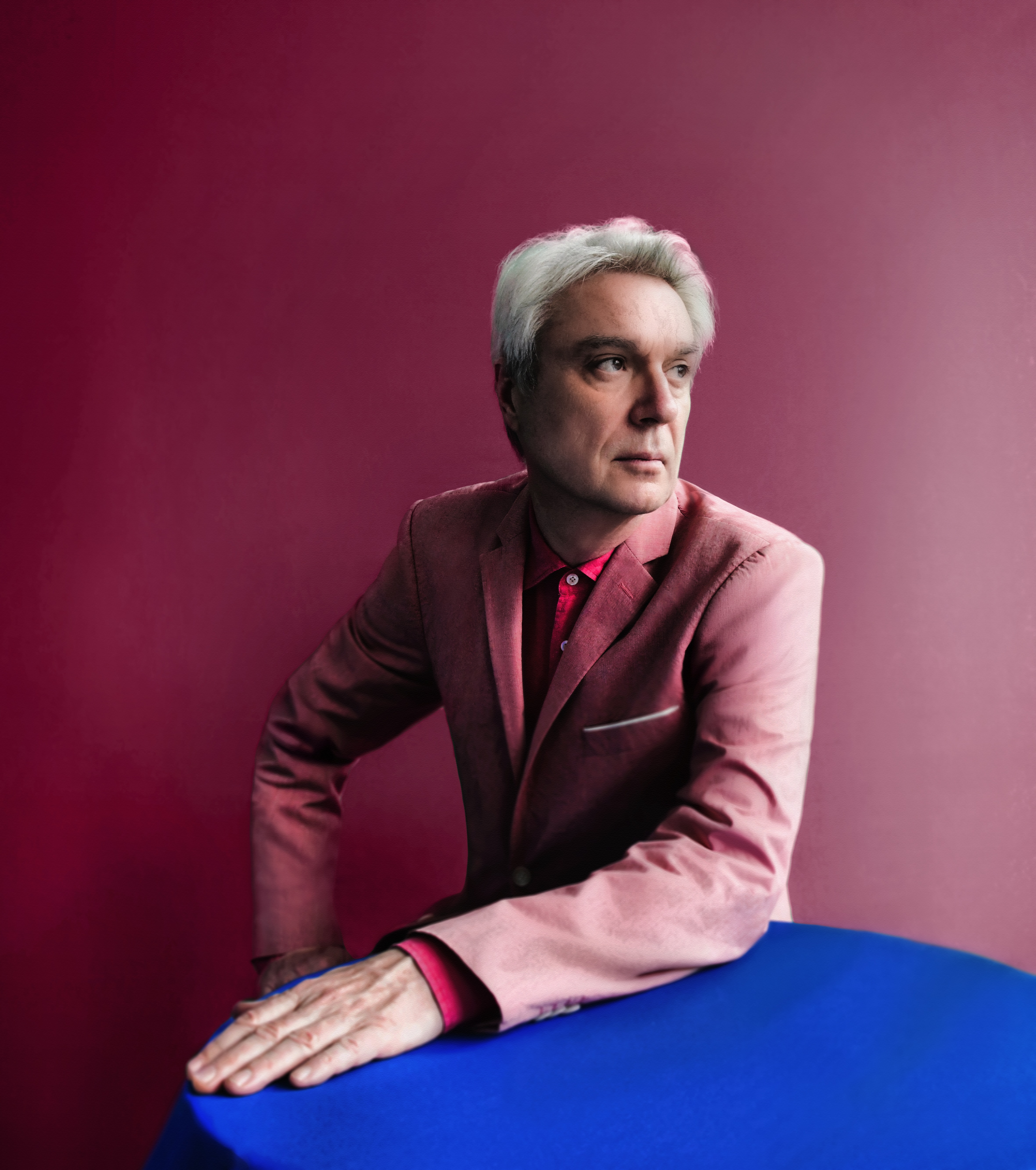
Credit: Shervin Lainez

Audio By Carbonatix
No one sees the world from quite the same vantage as David Byrne. Once described as “an anthropologist from Mars,” the 73-year-old music legend is often depicted as an alien observer of humanity’s most peculiar habits and hang-ups. But just like his warm, weird songs about the strangeness and beauty of our lives here on Earth — from his era-defining work with Talking Heads to his recent decades as a boundary-pushing solo artist — the insight of this time-tested pop culture icon is distinctly human.
On the heels of his biggest moment of the millennium, including a 2019 Broadway show and concert film by Oscar winner Spike Lee, the inimitable frontman is back with a brand new record, Who Is the Sky? . The eleventh offering under his own name, Byrne’s latest LP continues a tradition of collaboration with backing band Ghost Train Orchestra and guest spots from St. Vincent and Paramore’s Hayley Williams. Careening from ecstatic to introspective, his new genre-hopping album is shot through with the rich melodies, deep grooves and bright-eyed optimism listeners have come to expect after nearly half a century in the spotlight.
Westword spoke with Byrne on a day off in Chicago during his ongoing tour, his first since the blissful American Utopia road show seven years ago, which comes to Denver for a two-night run at Bellco Theatre beginning November 6.
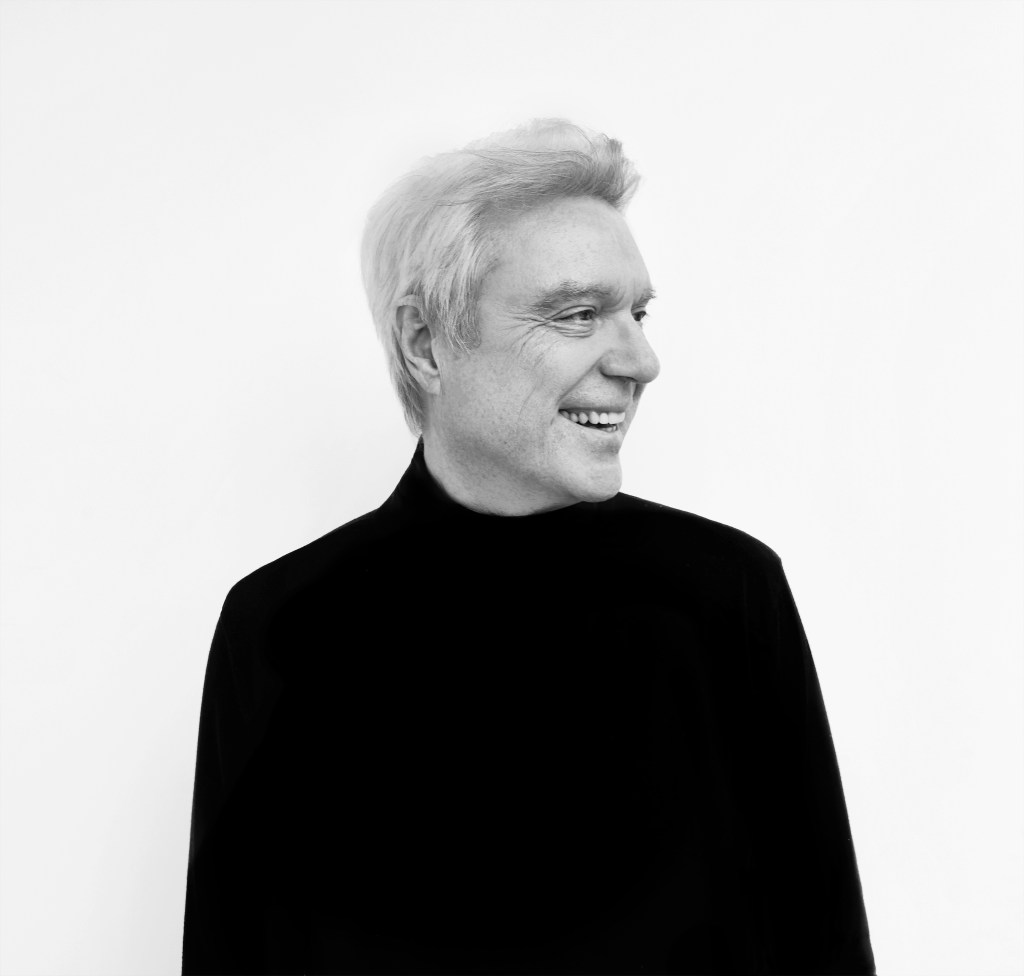
Credit: Shervin Lainez
Westword: Hi David. Thank you so much for speaking with me today. We’re very excited to welcome you back to Denver soon.
David Byrne: It’ll be good to be back.
You spent time in Denver when Theater of the Mind opened a few years ago. What was your impression of the city?
I really enjoyed it. I was there for a good few months during the summer [of 2022] when we were doing rehearsals and checking the tech and doing early preview runs where we were making little tweaks and changes. So I was spending a lot of time in town, and I felt very comfortable there.
I had a bicycle, which I still have, that I had shipped out so I could get around. I had some favorite places to eat and there were nice bike paths going all sorts of ways. I could take the train to Golden and bike to a trailhead there.
Now you’re back on stage performing music here for the first time since you brought American Utopia to Red Rocks in 2018. What can readers expect from this tour?
We’re similarly untethered. Everyone moves around, but now it’s much more colorful. There’s a lot more singers and dancers. It engages with the present situation that we’re in, but it’s also very celebratory.
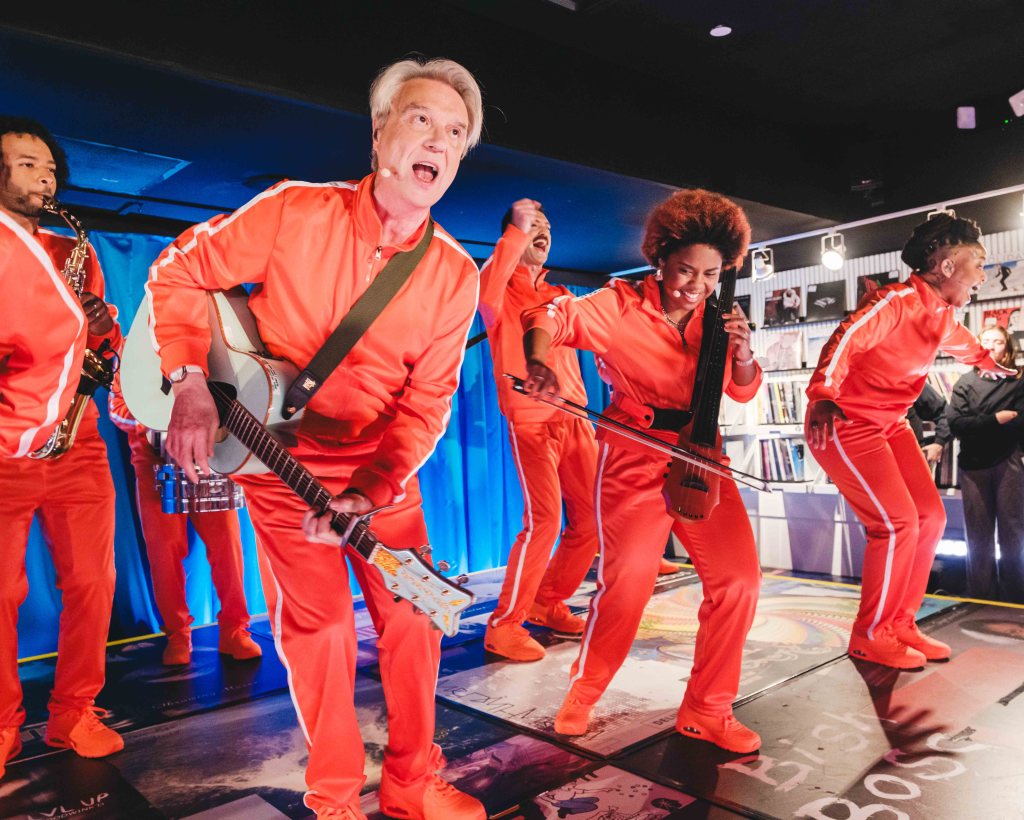
Credit: Emilio Herce
The last time you went on the road, it resulted in a Broadway show and a film directed by Spike Lee. Do you feel pressure to top yourself when you’re building a whole new show?
To be honest, yes. I thought, ‘Oh, people might compare it to American Utopia, because we’re untethered.’ I mean, people do see that similarity. But other than that, the responses I’ve been getting have been very different. It’s a very different kind of show.
What kind of responses have you been getting?
I’m gonna leave that to you [laughs]. I make a point not to read the reviews, but I hear they’ve been very good.
You’re known as an artist who pushes the boundaries of what a concert can be. Have there been times when your vision has come into conflict with reality, when you wanted to do something that wasn’t feasible with a traditional stage show?
Yes. There’s one thing I’ve wanted to try pretty much ever since we started rehearsing this. For various reasons, it hasn’t worked. But I’m going to try another approach this weekend, so we’ll see if I can figure it out that way. I haven’t given up on it.
Can you give us a taste of what the idea is?
It involves animal masks — turning all the band into animals.
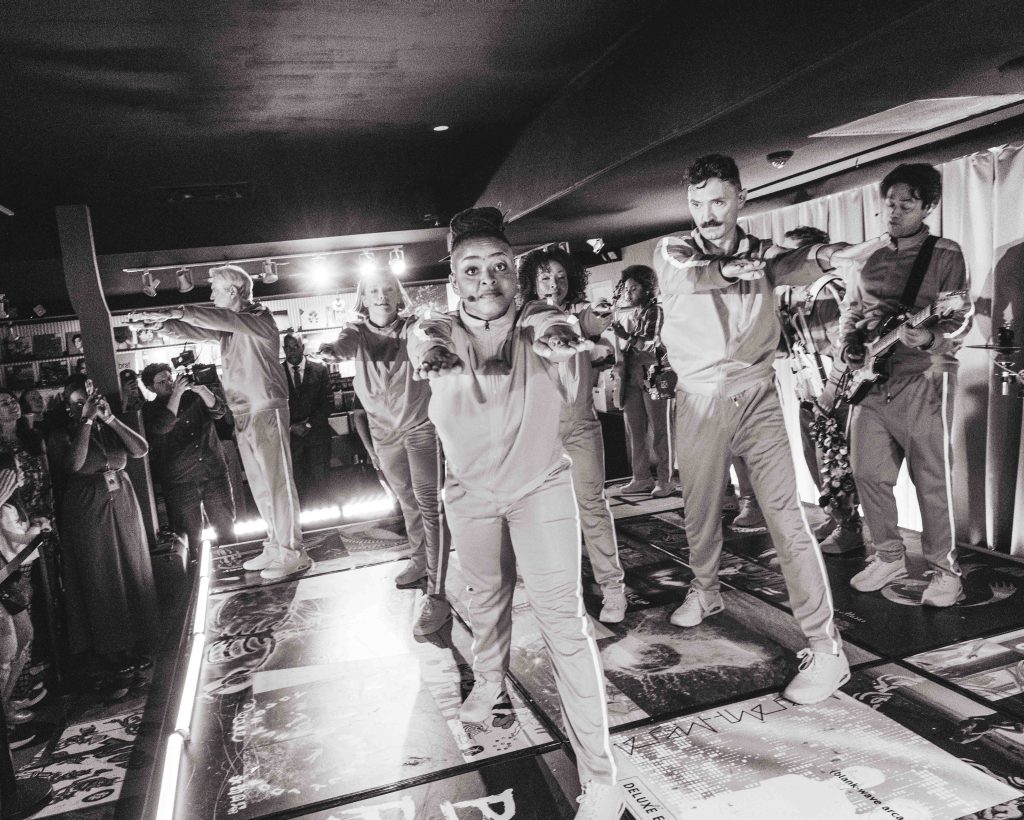
Credit: Emilio Herce
What was the rehearsal process like for this tour? I imagine it’s pretty extensive.
Yes, that’s an understatement [laughs]. There was six weeks of just music and choreographic rehearsal, and then I think it was another ten days of full production rehearsal, which means adding in the sound system, the lighting and these image projections we’re using for the show.
And I got married in between the two. It’s a lot, and we could have used more [rehearsal]. Just kind of cramming all that stuff in our heads and trying to remember it. Now we’ve got it. I mean, we’ve been on the road for a couple months or something. So we’re at the point where we’re not thinking it through every step of the way.
With the show, you’re not just playing material from your new album [Who Is the Sky?] but also digging into your back catalogue with Talking Heads. Did re-working any of those old songs from the archive cause you to hear them in a new light?
Oh yeah. A few of them have been very much rearranged. They’re still totally recognizable. I still sing the same melodies. I’m not going that far. Like “Psycho Killer”: There was a version the Talking Heads recorded that was arranged by the late Arthur Russell, a musician and singer and cello player. I thought, ‘Let’s go to that version rather than the one people are more familiar with.’

Courtesy: Matador Records
Let’s talk about your new record. What was your vision for it as you started piecing things together, and how did that vision stack up with the album you eventually made?
I had some songs I’d written, and I was continuing to write, when I heard this record by a small orchestra in New York called the Ghost Train Orchestra. I really liked the sound of it. They mixed kind of orchestral instruments with drums and bass guitars and all that kind of stuff. I thought they did it really well, interpreting the music of Moondog.
I approached them and said, ‘I would like you to be my band on this record. I know the skill set of your players, so I want you to do the arrangements as well, because you know what you’re best at.’ I went to a producer [Kid Harpoon] to kind of help with sound and wrangling all that — because it’s a lot, and it took quite a while.
Somewhere in the back of my mind, I thought those arrangements and that sound would bring out what is for me the latent emotion in a lot of the songs that is sometimes maybe not as apparent in the music. They did an incredible job and just really took it to another level.
The first track “Everybody Laughs” feels like a good place to dig in. You’ve described this as a love song to humanity, and it’s coming at a time when many of us don’t seem to be feeling much love for each other.
Yes [laughs]. Uh-huh.
Can you tell readers more about what you’re exploring here, and why you wanted to kick off the album in this celebratory mode?
It’s what I needed. I’ve heard other people say that too, but it’s definitely what I needed at this moment. When I say I’m celebrating humanity, I’m not just trying to make everything sweetness and light. It’s certainly not. I’m talking about pain and tears and happiness and death. It’s all one package. You can’t have part of it and not have the other part.
Human connection — how we relate, or don’t relate, to each other — seems to be a subject you return to a lot in your work.
Yes, and now more than ever. I think people are coming to realize that social media companies are not our friends. They’re not out to help us. They’re out to make money at our expense, at our children’s expense. Facebook has said, ‘Oh, we’re about connecting people.’ It’s not real connection. Connection is when people are sitting together, talking or doing something together: working together, singing together, walking together — whatever. Screens are not being together. I think we kind of attempt to give a little bit of an antidote to that.
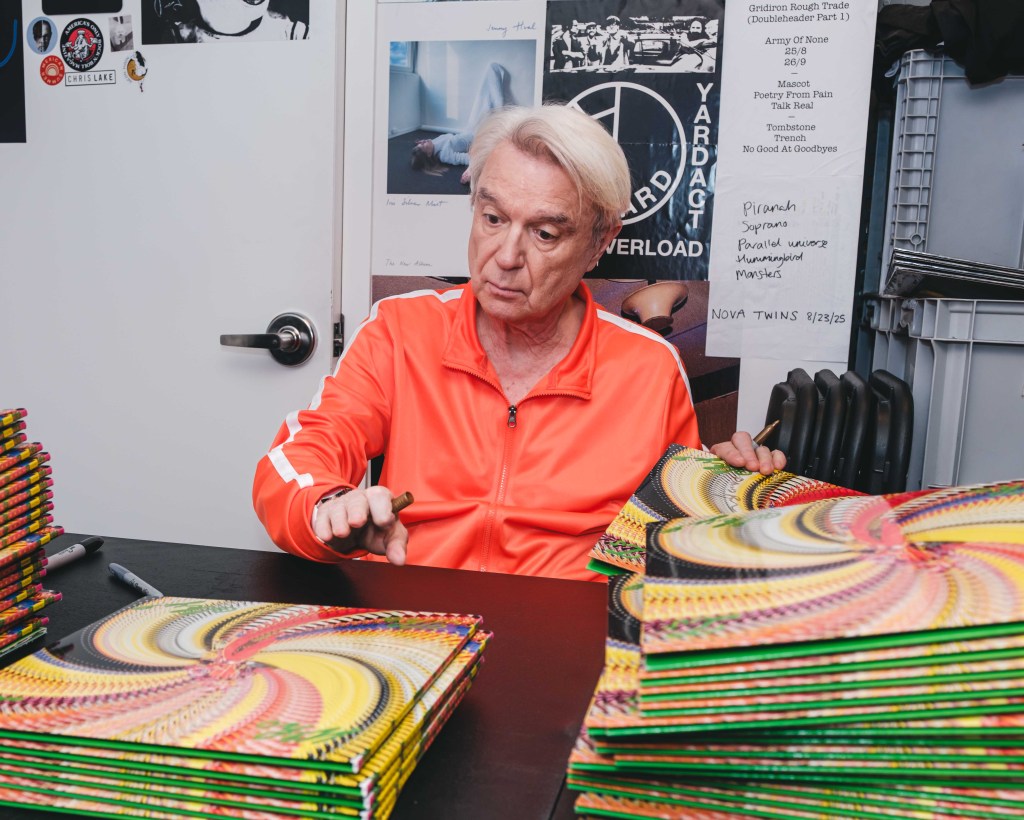
Credit: Emilio Herce
You say it had been a minute since American Utopia before you started writing songs again. What did it feel like when those gears started turning?
It’s really exciting to be thinking and experimenting and seeing what’s going to work. And it’s also terrifying. There’s budgetary constraints, so you have to work within those parameters. But there’s months and months of just experimentation. ‘Let’s try this and see if that works. Let’s try this. Let’s try this. No, that didn’t work. Try something else.’ There’s a lot of creativity that goes on before it gets to what it is.
Like American Utopia, your new tour engages pretty directly with some of our thorniest social issues. Why is it important for you as an artist to not turn away from the headlines at this moment in American life?
Wow. Well, we aim to entertain. There is an entertainment element in what we do. We’re putting on a concert, we’re putting on a show, all that. But at the same time, I want to acknowledge that we’re part of the real world, and it’s not just pure escapism. There’s enjoyment and celebration, but it’s not denying the world we live in.
You have a reputation for being something of an optimist. Is it harder to maintain a hopeful view of the world when things seem to be getting so much worse?
Yes, it’s hard. Some years ago, I started a kind of news project called Reasons to be Cheerful, and that’s what it is. There are journalists and editors and writers, and they seek to find examples of people who have found solutions to things. We tend to think everything is just going downhill, but they can serve as examples and convert for other people to follow.
An Evening with David Byrne, 8 p.m. Thursday, Nov. 6 and Friday, Nov. 7, Bellco Theatre at Denver Performing Arts Center, 1100 Stout Street. Tickets are $91.30 and up.